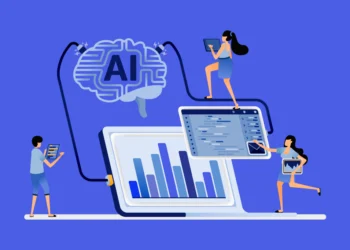If you’ve ever opened a shopping app and wondered, “How does it know so well what I want?” that is AI at work in the background. Right now, with the busy lives we lead, users expect shopping apps to be smart, quick, and personalized. Artificial intelligence is bringing apps to provide just such an experience, turning them from simple digital catalogs into smart assistants who know you and make you shop effortlessly.
This blog delves into how AI is transforming mobile application development in the e-commerce sector with a special focus on Bangalore, one of India’s hottest tech spots. We’ll look at the current state of AI in e-commerce applications, why choosing the best app development company matters, and what this means for business owners and consumers alike.
The Current State of AI in E-commerce

AI is no longer a thing of the future; it’s very much a part of our daily online shopping. Its influence can be seen all around:
Personalized Suggestions:
AI computes what you like with each swipe and tap. This enables apps to suggest products made just for you, so you’re more likely to find out what you actually want in seconds.
Natural Language Search:
No more typing specific keywords. AI-enabled apps know how we communicate — including fancy or ambiguous searches. So, when you search for “blue bag with silver chain under 1500,” the app understands and displays the right results.
Visual Search:
Saw something cool but forgot what it was called? Just snap a picture and let the app look for other products like it. AI uses image recognition to match your photo against available stock.
Smart Chatbots:
AI chatbots today are no longer programmed response robots. They understand your questions, help with orders, returns, and even give instant service 24/7, making customer service faster and more efficient.
Inventory & Price Optimization:
In the background, AI forecasts trends, manages stock, and dynamically optimizes prices based on demand and competition to provide improved bargains and stock availability.
Fraud Detection & Security:
AI detects suspicious activity in real-time to prevent fraud, protecting buyers and sellers alike.
Voice Assistance:
With voice commands catching up, AI-powered apps let you shop without putting your hands to use by merely informing them what you desire.
Order Tracking & Delivery:
AI optimizes deliveries more effectively and keeps customers posted on their orders, building confidence and satisfaction.
This widespread deployment of AI in e-commerce apps has rendered the shopping process highly efficient, personalized, and secure.
How to Choose the Right Mobile App Development Company

Not all developers are the same. Here’s what to keep in mind when choosing a partner for your AI-driven e-commerce app:
- AI & E-commerce Experience: Ensure that the company has prior experience with integrating AI features like recommendations, chatbots, and visual search into apps.
- Portfolio & Case Studies: Look for work they have performed, especially in your industry or related ones.
- Technical Expertise: They need to be experienced in the latest AI technologies, app frameworks, and cloud solutions.
- Customization Capability: Your application should be customized for you, so select a firm that won’t just apply templates but will build features customized to your users.
- Communication & Support: AI integration can be complex; you need someone who breaks it down so you can understand and offers continuous support.
- Budget & Timeline: Cost clarity and delivery timelines are crucial.
These being the factors considered, Bangalore’s mobile app development firms are notable due to their innovation focus and technology expertise.
12 Innovative AI Applications in E-commerce

1. Product Personalization
Personalization is arguably the most powerful application of AI in e-commerce. As a customer browses through an application, AI collects data such as product clicks, dwell time, cart behavior, past buys, and even browsing time. Drawing on machine learning algorithms, the app suggests products that suit the customer’s taste, style, and budget.
For example, if a user is an avid viewer of sneakers, AI can automatically highlight the latest launched sneakers, promotions, or sneakers that other similar users wear. This leads to increased engagement and overall increased conversion rates. It is similar to having a personal shopping guide for every user scaled and automated.
2. Visual Search and Image Recognition
Sometimes users do not know how to explain a product but can show what they are looking for. Visual search covers this gap. Using the strength of AI-driven image recognition, users just have to upload a picture from a magazine, Instagram, or even from life and the app identifies visually similar products.
Visual search e-commerce apps use deep learning algorithms for searching product pictures and matching them up by appearance, pattern, texture, or structure. It works especially well for fashion apparel, home decoration, and accessories where looks do matter. It makes shopping faster and reduces drop-offs in the search.
3. Natural Language Processing (NLP) for Smart Search
Traditional search bars are based on keywords. But AI uses NLP in a manner that identifies the intention of a search query. For instance, if a customer types “blue jacket under ₹1500 for rainy season,” an AI-based application is able to break down the search query and deliver results based on product color, category, price filter, and even weather-related characteristics.
This makes searching more human-like and accurate. Users don’t have to input perfect keywords; they just speak or type naturally. And the more accurate the results, the faster users can get what they seek maximizing satisfaction and reducing bounce rate.
4. AI-Powered Chatbots & Virtual Assistants
Chatbots are not mere pop-up windows they are smart, adaptive systems that can handle thousands of questions simultaneously. They respond with answers like “Where is my order?”, “Does this come in red?”, or “Can I return this after 10 days?” instantly and accurately.
Advanced robots also integrate with back-end systems to access order details, suggest products, cross-sell packages, and solve complaints. They are available 24/7, releasing human customer support and improving response time precious on sales or holiday periods.
5. Smart Inventory Management
Inventory management AI does not just track what is available, it predicts what should be available. Studying trends, seasonal levels, regional selling patterns, and supply chain dynamics, AI helps companies make more informed inventory decisions.
For instance, if a product is gaining popularity in Bangalore but not Delhi, AI can rebalance stocks dynamically. AI also prevents overstocking (capital-blocking) and understocking (lost sales), enhancing operational efficiency at last.
6. Dynamic Pricing Algorithms
AI enables firms to dynamically alter product prices on the web in real-time based on multiple parameters, rival prices, demand spikes, shortages of supply, festive seasons, and even user actions.
If a product is getting a lot of traffic and no sales, AI can recommend an offer to prod sales. If a product is in demand, AI can recommend increasing the price by just a fraction of a percent to capture maximum profits. Dynamic pricing allows businesses to remain competitive and profitable, especially in fast-paced industries like fashion and technology.
7. Fraud Detection and Transaction Monitoring
With increased digital payments comes an increased amount of fraud. AI secures platforms by identifying irregular patterns in logins, payments, or the placement of orders.
For example, if there is a login from two sources in a short span of time, or repeated ordering with large amounts using different cards, AI can detect the action, void the transaction, and notify the support team. Such proactive monitoring gives confidence and protects the platform and the users.
8. Predictive Analytics for Purchase Behavior
Ever wondered how apps seem to know that you’re about to spend money again? That’s predictive analytics at work. AI examines a user’s shopping habits, search history, cart behavior, and even refund habits to predict what they’ll most likely buy next and when.
For example, AI can prompt a customer to re-order a skin care product in 25 days or suggest similar products when adding a phone to the cart. This enhances repeat buys and creates a more user-friendly interface.
9. Voice-Enabled Shopping
As intelligent speakers and voice assistants are becoming more popular, e-commerce applications are adding voice search as well as voice-activated actions. Users can say something like, “Add black wireless headphones to my cart” or “Track my last order” and get immediate feedback.
AI converts the command with the help of NLP and speech recognition, performs the action, and even gives a voice response in a natural tone in most instances. This voiceless, immediate interaction is ideal for multitaskers and visually impaired users.
10. Customer Sentiment Analysis
AI programs scan hundreds of customer comments, ratings, social media updates, and survey questionnaires to understand what customers feel about products or services. This is called sentiment analysis.
Instead of just counting the number of stars or likes, AI interprets emotions, whether people are happy, annoyed, excited, or disappointed. Businesses then use these insights to improve the quality of products, fix service issues, or even adjust marketing voice.
11. Hyper-Personalized Marketing Automation
Those days of generic emails and promotions are over. AI makes it possible for hyper-personalization, where every communication is customized to the user’s behavior, purchase history, gender, location, and even device type.
For instance, if a user has just purchased a phone, they can get a push notification of a 10% discount on wireless earphones. While a cart abandoner could get a time-limited offer. This level of precision boosts click-through rates, conversions, and brand loyalty.
12. Post-Purchase Optimisation and Logistics
AI isn’t just until checkout, it makes post-purchase hassle-free as well. AI-powered logistics solutions optimise routes, predict traffic jams, and alert customers with real-time updates.
This reduces delivery time and provides more transparency. In case of delays, AI can trigger automated alerts, reschedule deliveries, or offer compensation. The result? Happy customers and hassle-free operations.
Why Bangalore Is a Hub for Mobile App Development
If you’re thinking of building a mobile app development company in Bangalore, we are one of the best places to look for development partners. The city boasts a huge pool of talented developers and companies that specialize in blending AI with mobile app technology.
Why Bangalore?
- The tech ecosystem is vibrant with startups and established IT firms.
- Access to top AI and machine learning experts.
- Proven track record of delivering scalable, secure, and user-friendly apps.
- Competitively priced with high-quality output.
An app development Bangalore-based mobile app development company won’t just code your app but also provide strategic guidance on how to implement AI features most optimally for your business needs.
Summary
AI is revolutionizing how customers shop and businesses operate online. AI-based mobile apps offer immediate, personalized, and secure experiences that keep customers. If you want to be a success in the competitive e-commerce market, it is no longer an option to disregard AI integration.
Choosing the right mobile app development company, especially one based in Bangalore with strong AI capabilities, can differentiate between a forgettable app and a game-changing platform. The future of e-commerce isn’t just mobile, it’s intelligent, personalized, and frictionless. Make sure your business is ready to take advantage of that future now.















